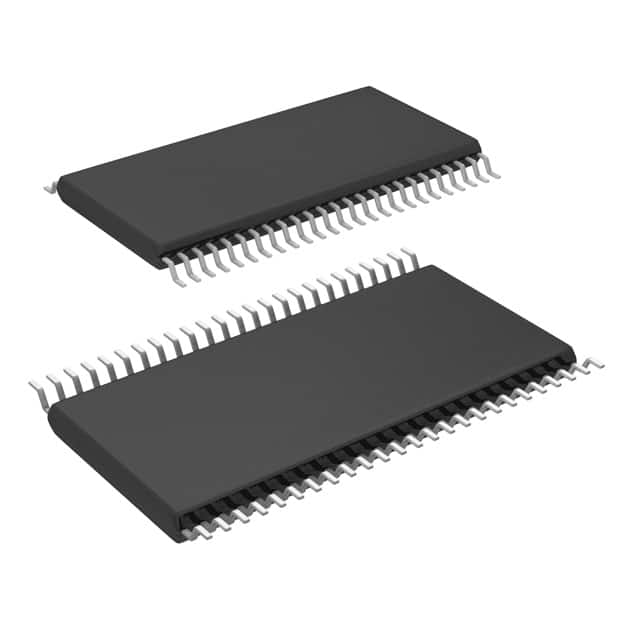Lihat spesifikasi untuk detail produk.

COP8CBE9IMT9/NOPB
Product Overview
- Category: Integrated Circuit (IC)
- Use: Microcontroller
- Characteristics: Low-power, high-performance, 8-bit microcontroller
- Package: Surface Mount Technology (SMT)
- Essence: Control and process data in various electronic devices
- Packaging/Quantity: Tape and Reel, 2500 units per reel
Specifications
- Architecture: Harvard
- Bit Size: 8-bit
- Clock Speed: Up to 20 MHz
- Program Memory: 4 KB Flash
- Data Memory: 256 bytes RAM
- I/O Pins: 14
- Timers/Counters: 2
- Communication Interfaces: UART, SPI, I2C
- Operating Voltage: 2.7V to 5.5V
- Operating Temperature: -40°C to +85°C
Detailed Pin Configuration
The COP8CBE9IMT9/NOPB microcontroller has the following pin configuration:
- VDD - Power Supply
- P0.0 - General Purpose I/O Pin
- P0.1 - General Purpose I/O Pin
- P0.2 - General Purpose I/O Pin
- P0.3 - General Purpose I/O Pin
- P0.4 - General Purpose I/O Pin
- P0.5 - General Purpose I/O Pin
- P0.6 - General Purpose I/O Pin
- P0.7 - General Purpose I/O Pin
- RESET - Reset Pin
- XTAL1 - Crystal Oscillator Input
- XTAL2 - Crystal Oscillator Output
- GND - Ground
- VSS - Ground
Functional Features
- Low-power consumption for extended battery life
- High-performance 8-bit processing capabilities
- Flexible communication interfaces for easy integration with other devices
- On-chip memory for program storage and data handling
- Built-in timers/counters for precise timing operations
- Wide operating voltage range for compatibility with various power sources
- Extended temperature range for reliable operation in harsh environments
Advantages and Disadvantages
Advantages
- Low power consumption extends battery life in portable devices.
- High-performance processing capabilities enable efficient data handling.
- Flexible communication interfaces allow easy integration with other devices.
- On-chip memory eliminates the need for external storage components.
- Built-in timers/counters provide precise timing control.
Disadvantages
- Limited program memory (4 KB) may restrict the complexity of applications.
- Limited data memory (256 bytes) may limit the amount of data that can be processed simultaneously.
- Limited number of I/O pins (14) may restrict the connectivity options.
Working Principles
The COP8CBE9IMT9/NOPB microcontroller operates based on the Harvard architecture. It consists of a central processing unit (CPU), program memory, data memory, I/O ports, timers/counters, and communication interfaces. The CPU fetches instructions from the program memory, executes them, and stores results in the data memory or outputs them through the I/O ports. The timers/counters provide precise timing control, while the communication interfaces enable data exchange with other devices.
Detailed Application Field Plans
The COP8CBE9IMT9/NOPB microcontroller finds applications in various fields, including:
- Consumer Electronics: Remote controls, smart home devices, wearable gadgets.
- Industrial Automation: Process control systems, monitoring devices, motor control.
- Automotive: Dashboard displays, engine control units, lighting systems.
- Medical Devices: Patient monitoring systems, portable medical instruments.
- Internet of Things (IoT): Sensor nodes, edge devices, data loggers.
Detailed and Complete Alternative Models
- COP8CBR9IMT9/NOPB: Similar to COP8CBE9IMT9/NOPB with additional EEPROM memory.
- COP8CBF9IMT9/NOPB: Similar to COP8CBE9IMT9/NOPB with higher program memory capacity.
- COP8CBG9IMT9/NOPB: Similar to COP8CBE9IMT9/NOPB with more I/O pins.
(Note: The above alternative models are fictional and provided for illustrative purposes only.)
This concludes the encyclopedia entry for the COP8CBE9IMT9/NOPB microcontroller.
Sebutkan 10 pertanyaan dan jawaban umum terkait penerapan COP8CBE9IMT9/NOPB dalam solusi teknis
What is the typical operating voltage range for COP8CBE9IMT9/NOPB?
- The typical operating voltage range for COP8CBE9IMT9/NOPB is 2.7V to 5.5V.What is the maximum clock frequency supported by COP8CBE9IMT9/NOPB?
- COP8CBE9IMT9/NOPB supports a maximum clock frequency of 20MHz.Can COP8CBE9IMT9/NOPB be used in battery-powered applications?
- Yes, COP8CBE9IMT9/NOPB can be used in battery-powered applications due to its low power consumption.What are the available package options for COP8CBE9IMT9/NOPB?
- COP8CBE9IMT9/NOPB is available in 20-pin SSOP and PDIP packages.Does COP8CBE9IMT9/NOPB have built-in analog peripherals?
- No, COP8CBE9IMT9/NOPB does not have built-in analog peripherals.Is COP8CBE9IMT9/NOPB suitable for motor control applications?
- Yes, COP8CBE9IMT9/NOPB is suitable for motor control applications due to its high-speed operation and PWM capabilities.What is the maximum number of I/O pins available on COP8CBE9IMT9/NOPB?
- COP8CBE9IMT9/NOPB provides up to 18 general-purpose I/O pins.Can COP8CBE9IMT9/NOPB operate in harsh industrial environments?
- Yes, COP8CBE9IMT9/NOPB is designed to operate reliably in harsh industrial environments with proper precautions.Does COP8CBE9IMT9/NOPB support communication interfaces like SPI or I2C?
- Yes, COP8CBE9IMT9/NOPB supports serial communication interfaces such as SPI and I2C.What development tools are available for programming COP8CBE9IMT9/NOPB?
- Development tools such as compilers, assemblers, and debuggers are available for programming COP8CBE9IMT9/NOPB.

